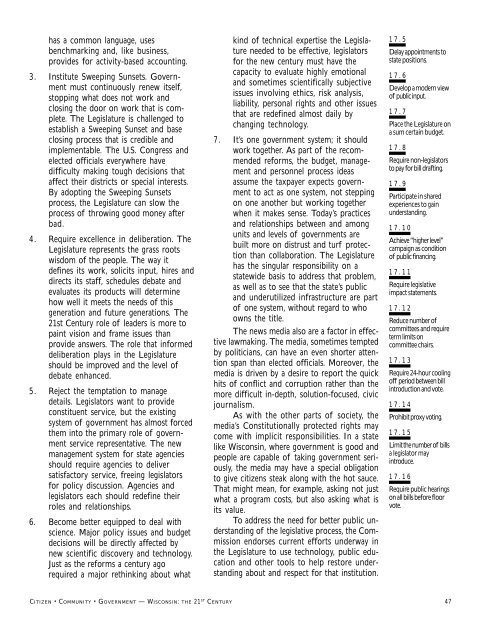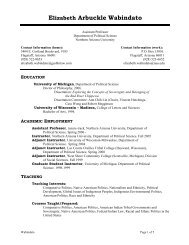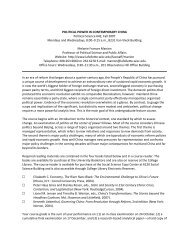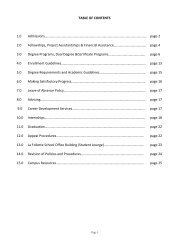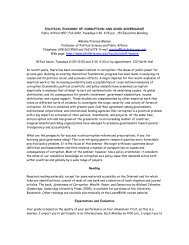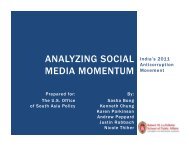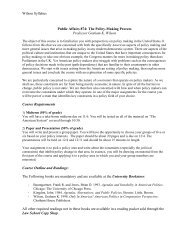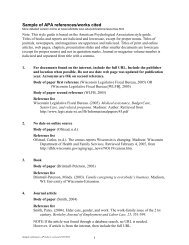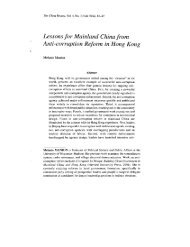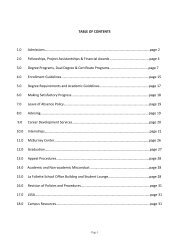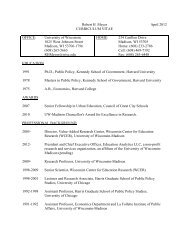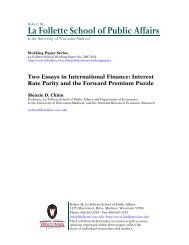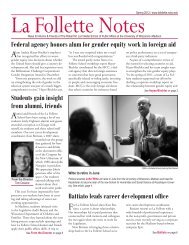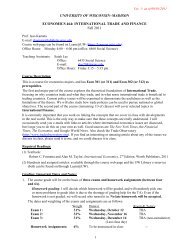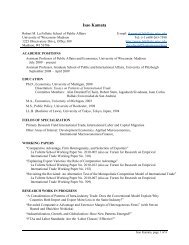SAVE Commission's findings - La Follette School of Public Affairs ...
SAVE Commission's findings - La Follette School of Public Affairs ...
SAVE Commission's findings - La Follette School of Public Affairs ...
You also want an ePaper? Increase the reach of your titles
YUMPU automatically turns print PDFs into web optimized ePapers that Google loves.
has a common language, uses<br />
benchmarking and, like business,<br />
provides for activity-based accounting.<br />
3. Institute Sweeping Sunsets. Government<br />
must continuously renew itself,<br />
stopping what does not work and<br />
closing the door on work that is complete.<br />
The Legislature is challenged to<br />
establish a Sweeping Sunset and base<br />
closing process that is credible and<br />
implementable. The U.S. Congress and<br />
elected <strong>of</strong>ficials everywhere have<br />
difficulty making tough decisions that<br />
affect their districts or special interests.<br />
By adopting the Sweeping Sunsets<br />
process, the Legislature can slow the<br />
process <strong>of</strong> throwing good money after<br />
bad.<br />
4. Require excellence in deliberation. The<br />
Legislature represents the grass roots<br />
wisdom <strong>of</strong> the people. The way it<br />
defines its work, solicits input, hires and<br />
directs its staff, schedules debate and<br />
evaluates its products will determine<br />
how well it meets the needs <strong>of</strong> this<br />
generation and future generations. The<br />
21st Century role <strong>of</strong> leaders is more to<br />
paint vision and frame issues than<br />
provide answers. The role that informed<br />
deliberation plays in the Legislature<br />
should be improved and the level <strong>of</strong><br />
debate enhanced.<br />
5. Reject the temptation to manage<br />
details. Legislators want to provide<br />
constituent service, but the existing<br />
system <strong>of</strong> government has almost forced<br />
them into the primary role <strong>of</strong> government<br />
service representative. The new<br />
management system for state agencies<br />
should require agencies to deliver<br />
satisfactory service, freeing legislators<br />
for policy discussion. Agencies and<br />
legislators each should redefine their<br />
roles and relationships.<br />
6. Become better equipped to deal with<br />
science. Major policy issues and budget<br />
decisions will be directly affected by<br />
new scientific discovery and technology.<br />
Just as the reforms a century ago<br />
required a major rethinking about what<br />
kind <strong>of</strong> technical expertise the Legislature<br />
needed to be effective, legislators<br />
for the new century must have the<br />
capacity to evaluate highly emotional<br />
and sometimes scientifically subjective<br />
issues involving ethics, risk analysis,<br />
liability, personal rights and other issues<br />
that are redefined almost daily by<br />
changing technology.<br />
7. It’s one government system; it should<br />
work together. As part <strong>of</strong> the recommended<br />
reforms, the budget, management<br />
and personnel process ideas<br />
assume the taxpayer expects government<br />
to act as one system, not stepping<br />
on one another but working together<br />
when it makes sense. Today’s practices<br />
and relationships between and among<br />
units and levels <strong>of</strong> governments are<br />
built more on distrust and turf protection<br />
than collaboration. The Legislature<br />
has the singular responsibility on a<br />
statewide basis to address that problem,<br />
as well as to see that the state’s public<br />
and underutilized infrastructure are part<br />
<strong>of</strong> one system, without regard to who<br />
owns the title.<br />
The news media also are a factor in effective<br />
lawmaking. The media, sometimes tempted<br />
by politicians, can have an even shorter attention<br />
span than elected <strong>of</strong>ficials. Moreover, the<br />
media is driven by a desire to report the quick<br />
hits <strong>of</strong> conflict and corruption rather than the<br />
more difficult in-depth, solution-focused, civic<br />
journalism.<br />
As with the other parts <strong>of</strong> society, the<br />
media’s Constitutionally protected rights may<br />
come with implicit responsibilities. In a state<br />
like Wisconsin, where government is good and<br />
people are capable <strong>of</strong> taking government seriously,<br />
the media may have a special obligation<br />
to give citizens steak along with the hot sauce.<br />
That might mean, for example, asking not just<br />
what a program costs, but also asking what is<br />
its value.<br />
To address the need for better public understanding<br />
<strong>of</strong> the legislative process, the Commission<br />
endorses current efforts underway in<br />
the Legislature to use technology, public education<br />
and other tools to help restore understanding<br />
about and respect for that institution.<br />
17.5<br />
Delay appointments to<br />
state positions.<br />
17.6<br />
Develop a modern view<br />
<strong>of</strong> public input.<br />
17.7<br />
Place the Legislature on<br />
a sum certain budget.<br />
17.8<br />
Require non-legislators<br />
to pay for bill drafting.<br />
17.9<br />
Participate in shared<br />
experiences to gain<br />
understanding.<br />
17.10<br />
Achieve “higher level”<br />
campaign as condition<br />
<strong>of</strong> public financing.<br />
17.11<br />
Require legislative<br />
impact statements.<br />
17.12<br />
Reduce number <strong>of</strong><br />
committees and require<br />
term limits on<br />
committee chairs.<br />
17.13<br />
Require 24-hour cooling<br />
<strong>of</strong>f period between bill<br />
introduction and vote.<br />
17.14<br />
Prohibit proxy voting.<br />
17.15<br />
Limit the number <strong>of</strong> bills<br />
a legislator may<br />
introduce.<br />
17.16<br />
Require public hearings<br />
on all bills before floor<br />
vote.<br />
CITIZEN • COMMUNITY • GOVERNMENT — WISCONSIN: THE 21 ST CENTURY 47


